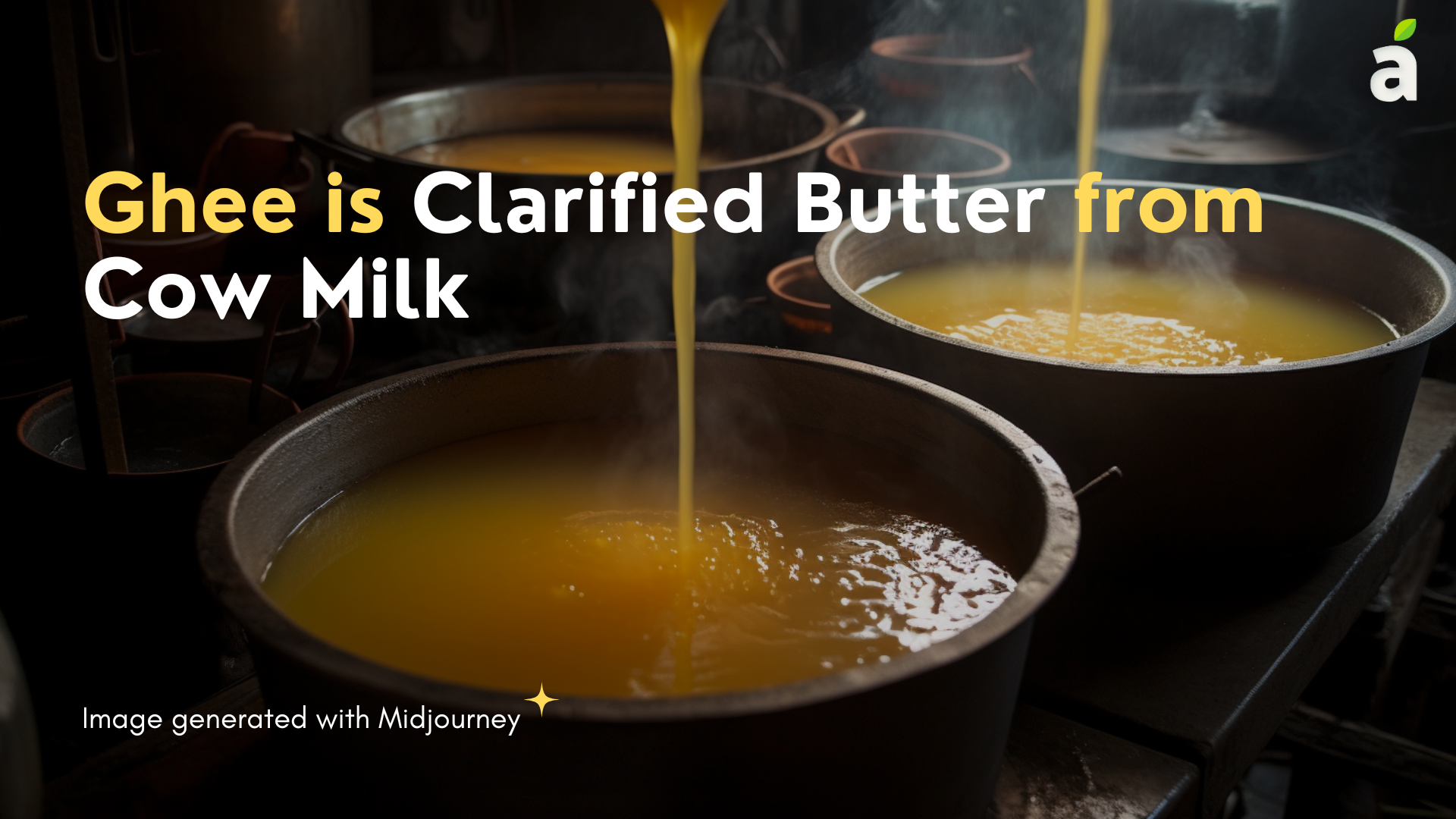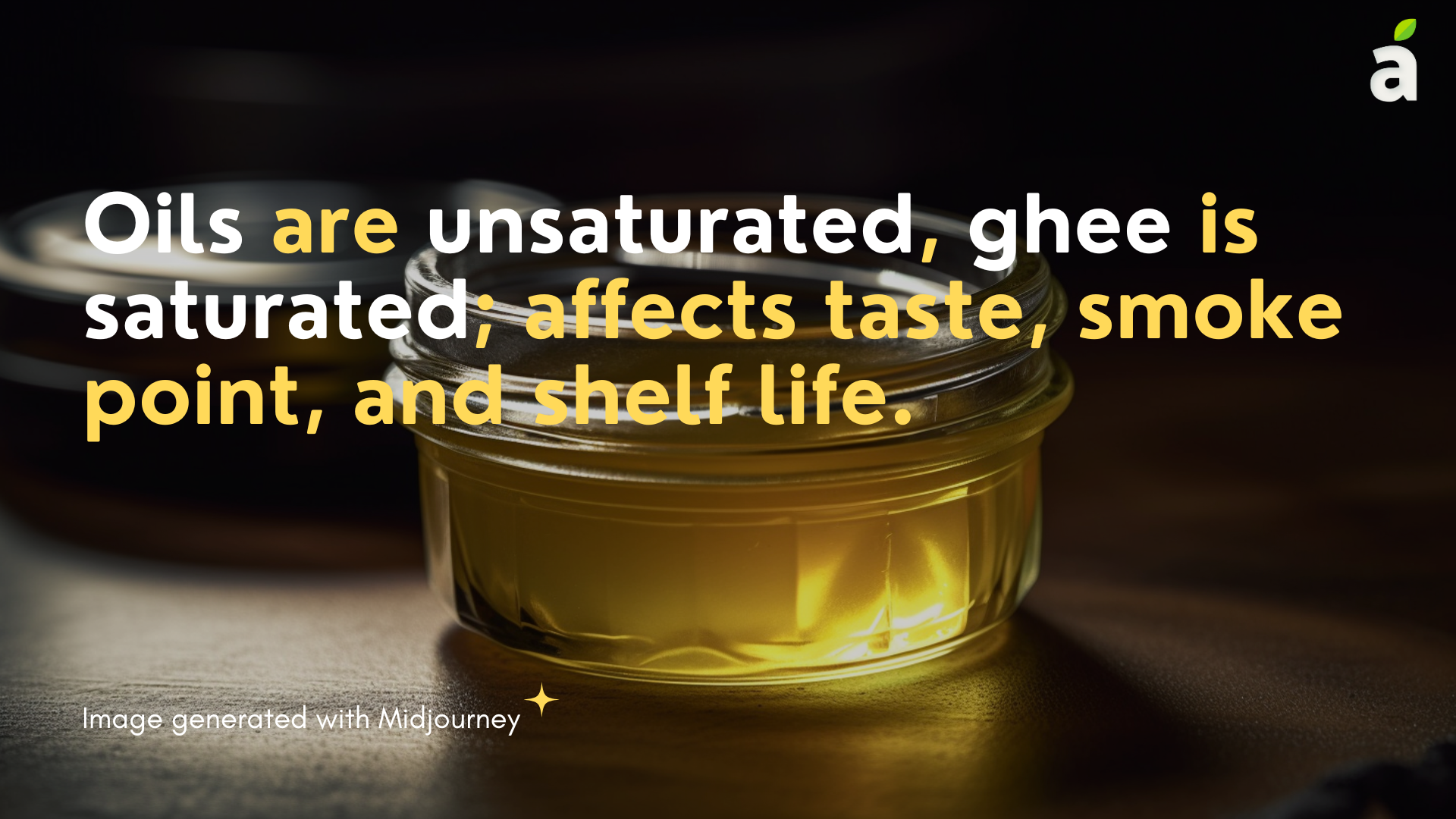Published Date January 24, 2003
Ghee: The Golden Elixir
By Naurin Ansari
3 min read
Last update date: January 24, 2003

Ghee, also known as clarified butter, has been a staple in traditional Indian cuisine for centuries. Ghee is a culinary delight known for its rich flavour and unique aroma and holds cultural and medicinal significance.
In this blog, we will delve into the world of ghee, exploring its origins, potential risks, and its role in comparison to oils. Additionally, we will discuss who should exercise caution when incorporating ghee into their diet.
What is Ghee?
Ghee, a variation of clarified butter, is derived from cow milk butter through a process of heating and separating the milk solids. This results in a golden, semi-solid fat with a distinct nutty flavour. With its higher smoke point, ghee is well-suited for high-heat cooking methods. It contains a unique composition of saturated fats, monounsaturated fats, and small amounts of vitamins A, E, and K.
Ghee is made by heating cow milk butter at low temperatures, allowing the water to evaporate and leaving only the clarified liquid fat behind. This process helps retain more nutrients compared to standard clarified butter. One teaspoon of ghee provides 42 calories, 5 grams of fat, and zero sugar. It also serves as a good source of Vitamin E, known for its antioxidant properties.[1]
Risks of Ghee
While ghee can offer various advantages, it is crucial to understand the associated risks. Excessive consumption of ghee, which is high in calories and saturated fats, can lead to weight gain and elevated cholesterol levels.
Individuals with existing heart conditions or a history of high cholesterol should consume ghee in moderation. Additionally, those with lactose intolerance or dairy allergies should avoid ghee due to its trace amounts of milk proteins.
It is important to exercise moderation when consuming ghee due to its high-fat content, as excessive intake can increase the risk of heart disease. Furthermore, individuals with coughs and colds should avoid "desi ghee" as it can potentially aggravate throat irritation.[2]
Oil vs. Ghee: Decoding the Differences
The ongoing discussion regarding oils versus ghee tends to pique the interest of health-conscious individuals. Each of them has their own advantages and disadvantages, and understanding their differences can help make informed decisions about your diet. Oils primarily consist of unsaturated fats, while ghee contains a higher proportion of saturated fats.
This disparity in fat composition affects factors such as taste, smoke point, and shelf life. Monounsaturated fats found in oils like olive and avocado can promote heart health, while saturated fats in ghee can provide stability during cooking and offer potential health benefits when consumed moderately.
Refined vegetable oils are commonly used in cooking and undergo a process to remove flavour, colour, odour, and other undesirable elements. However, these oils may negatively affect the digestive and respiratory systems and are associated with conditions like diabetes, high cholesterol, and cardiovascular diseases.
In contrast, consuming ghee in appropriate quantities may help reduce the risk of heart ailments. Additionally, some vegetable oils may undergo purification processes involving nickel, which can have carcinogenic effects and contribute to the development of cancer.[3]
Who Should Avoid Ghee?
While ghee holds a significant cultural and historical significance, there are specific groups of people who should exercise caution when consuming it. Individuals with pre-existing cardiovascular conditions, obesity, or high cholesterol levels should moderate their intake of ghee due to its potential to elevate cholesterol levels. Additionally, those with lactose intolerance, dairy allergies, or sensitivities to milk proteins should avoid ghee to prevent any adverse reactions.
Ghee can be heavy to digest and its effects on digestion vary among individuals. While it may act as a laxative for some, it can have the opposite effect for individuals with chronic indigestion or stomach issues. Pregnant women, who often experience bloating and indigestion, are advised to limit their consumption of ghee during pregnancy, especially if they have an upset stomach.[4]
Takeaway
Ghee, with its rich flavour and cultural significance, has found a special place in many kitchens around the world. While ghee offers unique taste and culinary benefits, it is crucial to be mindful of its risks, particularly for individuals with specific health conditions.
As with any dietary component, moderation is key. By understanding the nuances of ghee and making informed choices, we can enjoy its delights while maintaining a balanced and healthy lifestyle.
Choose Healthy With Us.
Know the real truth about your food. Stay informed and healthy, for free.

Download the App Now
Certified nutritionists trust our food recommendations. Safe to say, so can you :)










